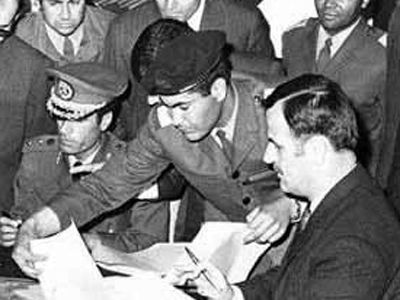Terrorism of a Bygone Era
The Lockerbie bomber's death prompts reflection on a time of rampant, state-sponsored terrorism.
 Muammar Qaddafi and Hafez al-Assad, 1971The death of Abdel Basset Ali al-Megrahi in Libya means the departure of a living link to an era of terrorism that was much different from what we see today. The 1980s was the peak of modern state-fomented international terrorism. The decade began with American diplomats being held hostage in Tehran. The next few years saw lethal terrorism carried out directly by several states. Iran conducted a sustained campaign of assassination of exiled Iranian dissidents. Syria attempted to blow up Israeli airliners. North Korea blew up a South Korean airliner and conducted a bombing in Burma intended to kill the visiting South Korean president. The Libyan regime of Muammar Qaddafi was active in terrorism on multiple fronts, including the bombing of a night club in Berlin frequented by U.S. servicemen. And it was Qaddafi's regime that killed 270 people by bombing Pan Am flight 103 in 1988—a crime for which Megrahi was the only person ever convicted.
Muammar Qaddafi and Hafez al-Assad, 1971The death of Abdel Basset Ali al-Megrahi in Libya means the departure of a living link to an era of terrorism that was much different from what we see today. The 1980s was the peak of modern state-fomented international terrorism. The decade began with American diplomats being held hostage in Tehran. The next few years saw lethal terrorism carried out directly by several states. Iran conducted a sustained campaign of assassination of exiled Iranian dissidents. Syria attempted to blow up Israeli airliners. North Korea blew up a South Korean airliner and conducted a bombing in Burma intended to kill the visiting South Korean president. The Libyan regime of Muammar Qaddafi was active in terrorism on multiple fronts, including the bombing of a night club in Berlin frequented by U.S. servicemen. And it was Qaddafi's regime that killed 270 people by bombing Pan Am flight 103 in 1988—a crime for which Megrahi was the only person ever convicted.
State-sponsored international terrorism declined precipitously over the subsequent two decades. Some of the reasons were specific to particular states that had been leading practitioners, such as the survival of the Islamic Revolution in Iran and the subsequent realization of rulers in Tehran that constant assassinations and subversion in neighboring states were not critical to keeping their regime alive. Two other factors had more general application. One was the end of the Cold War and demise of the Soviet Union, which had been an important source of aid to a state such as Syria—aid substantially greater than what Russia provides today. The other, related, factor was globalization and the escalation of opportunity costs of being a pariah state. Those costs, political as well as economic, provided the motivation for Qaddafi to get out of international terrorism (as well as out of the making of unconventional weapons) later in the 1990s, making this one of the most successful uses of international sanctions. The explicit demand associated with the sanctions was for Libya to surrender the two main Pan Am 103 suspects, Megrahi and Al Amin Khalifa Fhimah (who was tried along with Megrahi in a Scottish court but acquitted), which it did in 1999. This quickly led to secret talks with the United States that culminated four years later in a formal agreement between Libya and both the United States and United Kingdom.
Megrahi was a low-ranking figure who did not initiate anything significant but whose case exemplified some larger patterns in international terrorism. Little fish who execute plans and expose themselves to leaving evidence and getting caught tend to get caught more often than the big fish who are the true initiators of a operation. Megrahi performed acts that involved the killing of many innocent victims; he was deserving of punishment for his role in terrorism. There always was a element of artificiality in his prosecution, however, in that he was an employee of a state and following orders from others. Megrahi's release and return to Libya also exhibited some of the trade-offs and tensions involved in counterterrorism. The justification for his release was humanitarianism in light of the metastatic prostate cancer that was said to be weeks away from killing him, although he would live for another three years. Accusations were made at the time—and denied by British officials—that a desire for oil deals with the Libyan government had something to do with letting him go.
The Pan Am 103 operation demonstrated some other realities about international terrorism. One is how much the success of a terrorist plot, and whether it is discovered either before or after it is executed, depends on small accidental details. The timer on the bomb that Megrahi planted in luggage was set to go off while the plane was over the Atlantic, with the intention that the physical evidence would be lost in the ocean. A late departure of the flight meant that the plane came down instead on land, providing the scraps that enabled a long and painstaking investigation to tie the bomb to Libya. If the departure had been even later and the bomb detonated while the plane was on the ground or well below cruising altitude, it probably would have killed no one—and there still would have been the evidence to implicate the Libyans.
Another lesson concerns what would stimulate even a government as warped as Qaddafi's regime to do something as horrible as taking down that airliner. The bombing of Pan Am 103 was very likely Qaddafi's response to the U.S. aerial assault on Libya in 1986.
